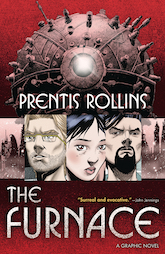At their best, graphic novels—comics—combine visual intensity and compelling narrative, like a television show without the drawbacks of actors and a special effects budget, and I’ve read enough to I know what I like. Veristic art, with clean lines and either black & white or strong, realistic colours; narratives that include interesting women (you’d never have guessed that one); and a strong thematic argument.
When I heard that Tor Books was publishing an original science fiction graphic novel called The Furnace, I was pretty interested.
I’m aware of my ignorance when it comes to graphic novels. Unlike with the non-graphic kind, I haven’t read widely enough to have a solid grasp on the genre’s more interesting nuances—though I’ve tried, on occasion, to get something of an overview. (It turns out I’m much more of a fan of Greg Rucka’s Stumptown and G. Willow Wilson’s current run on Ms. Marvel, of Squirrel Girl and Gail Simone’s run on Red Sonja and Ursula Vernon’s Digger, than I am of Alan Moore or Frank Miller.)
Buy the Book


The Furnace
The Furnace is written by Prentis Rollins, whose bio outs him as a 25-year veteran of the comics industry. Rollins is an illustrator by trade, and the art of The Furnace is all his doing. Art-wise, the book is visually very pleasing: the panels are cleanly laid out in a manner that makes the story’s progression easy to read and follow; the characters are visually distinct, the backgrounds full of life and movement. It’s very nice: the kind of quiet competence that doesn’t draw attention to itself and takes a long time to perfect.
The narrative, though. Unlike the art, the narrative is not particularly impressive. Not, at least, to me. It feels shallow, reductive, and self-indulgent, without a real emotional arc: the narrative of a flawed man wallowing in his moral failures because he doesn’t have the strength to accept them and move on.
But then, my tolerance for stories of straight white men in prestigious careers and how their moral weakness is the defining trauma of their adulthood is at an all-time low. (I’m sure it could get lower yet: I’m only in my early thirties, after all.) And my tolerance for stories in which gay white men are tortured by their fathers for their soi-disant “deviance” and go on to die young of overindulgence in alcohol (“Bury Your Gays” strikes again) is also very low. Especially when that death comes after said gay man has (a) attempted to proposition the straight guy narrator, declaring his unrequited love and attraction, and (b) successfully convinced the straight guy narrator to smother his moral qualms at being part of a government project that’s essentially a giant human rights abuse.
These kinds of storytelling choices make me blisteringly angry. The Furnace lets its main character off the hook—free from the obligation to do any work to fix his complicity in what’s essentially torture-through-isolation, free from the obligation to learn from it and do better—because he regrets it so much he’s become a shouty alcoholic who’s trying to be a good dad. And, moreover, The Furnace reinforces a tired, clichéd portrayal of gayness. (As well as doubling down on “brilliant genius asshole.”)
Good luck finding an adult female character in this graphic novel, by the way.
So, what’s the story? As a young graduate student, Walton Honderich was recruited by Marc Lepore to test his code. Lepore was working on a government project—the GARD programme—in which thousands of convicted criminals were to be given GARD units that rendered them invisible and unable to interact with the rest of humanity, and released from confinement. (Isolation is a well-recognised form of torture, but this graphic novel is set in the near-future U.S.A., so that’s pretty believable. On the other hand, considering how much the for-profit prison industry in America benefits from the forced labour of prisoners, my suspension of disbelief was rather rocky.) Honderich has qualms about the ethics of the project, but ultimately signs off on it. But shortly afterwards, Lepore dies, and with him dies the ability to shut down the GARD programme without killing the prisoners.
This is terrible science, and bad engineering, and has consequences.
Twenty years later, Honderich returns to America, a cranky alcoholic with a young daughter upon whom he dotes, and is faced with evidence of his youthful moral weakness. He attempts to explain the story to his daughter, and the final panels are of his daughter displaying compassion, and father-daughter familial bonding and reconciliation.
As a story, it’s shallow. Its conclusion offers a sense of redemption, but it’s unearned redemption. It feels self-indulgent, and it leaves me equal parts annoyed and enraged.
I really can’t recommend The Furnace. But I suspect it will appeal to people who can see themselves in Honderich and his choices, and who have more sympathy for his self-indulgent self-flagellation and its effects on the people around him than I do.
The Furnace is available from Tor Books.
Preview a selection from the graphic novel here.
Liz Bourke is a cranky queer person who reads books. She holds a Ph.D in Classics from Trinity College, Dublin. Her first book, Sleeping With Monsters, a collection of reviews and criticism, was published in 2017 by Aqueduct Press. It was a finalist for the 2018 Locus Awards and is nominated for a Hugo Award in Best Related Work. Find her at her blog, where she’s been known to talk about even more books thanks to her Patreon supporters. Or find her at her Twitter. She supports the work of the Irish Refugee Council, the Transgender Equality Network Ireland, and the Abortion Rights Campaign.










